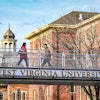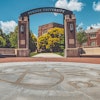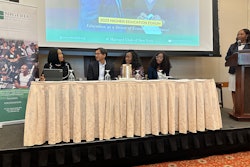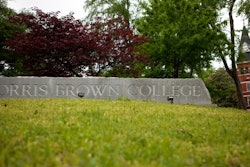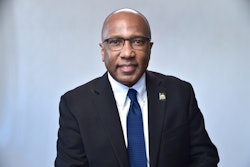HATTIESBURG Miss.
Claire Wright, a 19-year-old exchange student from Surrey, England, would have had a difficult first week of school had it not been for her host family.
After crossing the ocean, she missed her connecting flight into New Orleans, lost her suitcase at the Atlanta airport, and was stranded 4,600 miles from home a day late for orientation at the University of Southern Mississippi.
She spent the night in New Orleans with her study abroad advisor’s mother. Without possessions, she took a train to Hattiesburg where Bob Press was waiting to take her to campus.
Bob Press, an assistant professor of political science, and Betty Press, a photographer and part-time instructor in the art department, have been hosting students in the USM hospitality program for three years, and they were prepared to help Wright get to class and find some toothpaste.
Seven weeks later, Wright said she has settled in and fallen in love with the weather, but will probably never like fried okra.
“I didn’t expect everything to be so big,” said Wright, a history and sociology major who began her studies at Keele University in England. “To cross a road is like a mile from one side to the other, and you have separate lanes for turning, I could never drive it.”
Wright is one of 10 visiting international students studying at USM. This year’s batch includes students from Germany, France, Spain and England, but each year new students arrive and a handful of families open their homes to them.
“Our hospitality program is in its eighth year,” said Alex Kenner, international programs coordinator at USM. “In this program, we pair incoming exchange students with members of the Hattiesburg community during their first week in the United States to make their transition into American culture a little more personal.”
Kenner said students often maintain their relationships with their host families throughout the year, and sometimes even after their departure. She said host families or students sometimes travel abroad to visit after the program ends.
According to Kenner, USM has a bilateral partnership agreement with 12 universities abroad in eight countries. In 1999, Kaplan’s Newsweek College Catalog rated USM as one of the top universities in notable study-abroad programs and USM’s study-abroad programs consistently rank in the top 10 nationally.
There is no fee to host a student, and the families typically provide one meal per day, as well as transportation to and from the orientation sessions on campus. Everything else is optional, but Kenner said the host families often show the students around town and help them orient themselves with the area outside of the university.
“It’s just fun,” Bob Press said. “You get to know students from different countries and get to hear different perspectives on our country.”
Bob and Betty Press said they enjoy the program and try to expose students they host to as much as possible.
“We play it by ear, some want to go places, and we try to do that.” Bob Press said. “We took Tia, a Canadian, and a friend of hers on a tour of the Delta and to a blues festival. We don’t really plan these things. We just include them in what we do.”
Betty Press said they intend to continue hosting students in the future, and both she and Bob hope the program expands because there are hundreds of international students who come to USM each year who do not benefit from host families.
“It’s not that hard,” Betty Press said. “There isn’t much you have to do other than have a bedroom available.”
Lucie LaPierre, 21, came to USM from Bagneux, France, to study sports administration after spending a year in high school in Wisconsin.
“I wanted to come back and see what the college student life is,” LaPierre said. “We always hear how the South is different from the North. The South is one part of the USA that I had never been before. When we say Mississippi, we think Tom Sawyer, because of the river, even though it (the novel) is in Missouri, and for some of us the movie ‘Mississippi Burning,’ so I was expecting tensions between whites and blacks.”
LaPierre said most of those stereotypes turned out to be false, except for the infamous Southern hospitality.
“It surprised me that when you just walked by someone on campus, they say ‘hi’ even though you never met them before.”
Wright, too, had heard many things about the South before arriving.
“I had heard about race, about black people don’t talk to white people, and you don’t mix,” Wright said, adding she had also heard people in the South were very religious.
“The race issue is not as bad as it is made out. Black and white people do mix, and they do have interracial relationships. The Bible bit probably is true, but there are loads of parties and people still drink.”
Wright heads home Dec. 15, and she said she had mixed feelings.
“I don’t really want to go back to cold weather and miserable people,” Wright said. “But it will be Christmas, which will be fun. I will get to see my family and boyfriend, which will be good, but I will miss everyone here. I know I may never see some of these people again for the rest of my life.”
Information from: Hattiesburg American, https://www.hattiesburgamerican.com/
© Copyright 2005 by DiverseEducation.com

